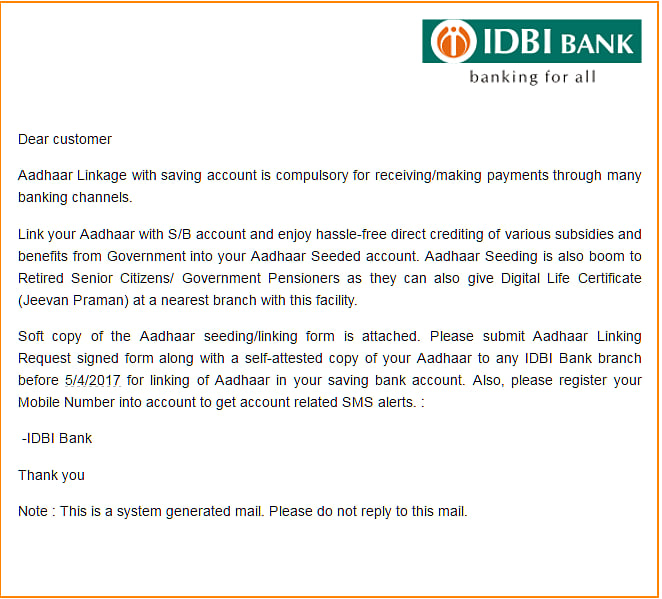When A Bank Comes Calling, Do You Have To Give Your Aadhaar Number?
Banks can ask customers for their Aadhaar numbers but can they insist on it?
.jpg?rect=0%2C0%2C1280%2C720&w=200)
Furnishing your Aadhaar number is now mandatory for filing tax returns. But tax authorities are not the only ones coming after your unique identity number. Banks are also pushing (and in some cases forcing) customers to link their accounts to their Aadhaar numbers.
Over 1.13 billion Indians now have an Aadhaar, a unique identity number, which, over time has become the government’s preferred way of identifying citizens. Social benefits have been linked to the biometric based identity proof as a way to reduce leakages. Starting this fiscal year, it has also been made compulsory for tax filing - a decision which is under review at the Supreme Court. For banking services, however, the Aadhaar card is still only one of six acceptable KYC (know your customer) documents listed by the Reserve Bank of India (RBI).
Even so, some banks are coercing customers to furnish their Aadhaar details.
IDBI Bank, for instance, has sent emails to customers claiming that an Aadhaar linkage is mandatory to transact through banking channels. BloombergQuint accessed copies of the email sent by the bank to three different customers. The mail, produced here, tells customers that linking a savings account to Aadhaar is compulsory.

The bank has not yet responded to a April 17 BloombergQuint email seeking comment.
Some customers of IDBI Bank have taken to Twitter to register their complaints. In response, the bank’s official handle clarified that while it is not mandatory to link bank accounts to Aadhaar numbers, customers are encouraged to do so.
@vganesh IDBI Bank encourages linking of Aadhaar number in savings bank account. 2/2
— IDBI BANK (@IDBI_Bank) March 30, 2017
Other banks appear to have stayed away from the use of the word ‘mandatory’ in their communication but are encouraging customers to share their Aadhaar information. Only when specifically asked are banks clarifying that furnishing Aadhaar information is not mandatory.
@AbbasKazmi3 There is no such deadline, but we suggest you to link your Aadhaar with Savings bank account as soon as possible to avail various benefits
— Union Bank of India (@UnionBankTweets) March 31, 2017
@NadimShayk Aadhaar is not mandatory for availing banking services as any of the approved KYC documents are acceptable. Thank you.
— State Bank of India (@TheOfficialSBI) April 11, 2017
Are Banks Permitted To Ask For Your Aadhaar?
The answer to that is - yes, but...
A reading of the Aadhaar Act shows that it allows the unique identification number to be used for KYC purposes by private agencies, such as banks, provided that the use is pursuant to set down laws and obligations.
Nothing contained in this Act shall prevent the use of Aadhaar number for establishing the identity of an individual for any purpose, whether by the State or any body corporate or person, pursuant to any law, for the time being in force, or any contract to this effect.Aadhaar Act, 2016
In fact, nothing in the Aadhaar Act prevents banks from making Aadhaar linkage mandatory for customers.
But in a 2015 order the Supreme Court had said that the government cannot make Aadhaar mandatory.
Rahul Matthan, a partner at law firm Trilegal, explained that the Supreme Court’s judgement applies to government provided services alone. This suggests that banks are on firm footing in asking for Aadhaar documentation.
“Private entities can of course insist on Aadhaar to authenticate you since the Supreme Court judgement only applies to government provided services which would be otherwise due to a citizen. But, an argument could be made that banks can’t lock your money just because you don’t have an Aadhaar number so they should at least be allowing you to access it and close your account,” Matthan told BloombergQuint.
While the Aadhaar Act does not prevent banks from making it a mandatory document, prevailing Reserve Bank of India (RBI) regulations do. These guidelines list six documents, any of which can be used for KYC purposes.
The Government of India has notified six documents as ‘Officially Valid Documents’ (OVDs) for the purpose of producing proof of identity. These six documents are Passport, Driving Licence, Voters’ Identity Card, PAN Card, Aadhaar Card issued by UIDAI and NREGA Job Card. You need to submit any one of these documents as proof of identity.RBI Know Your Customer Guidelines
A ‘Pre-Emptive’ Demand
Bankers agree that the Aadhaar is not mandatory. In cases where there is a push back from customers, the banks acknowledge that customers have a choice in the matter. Yet their communications to customers, such as the one from HDFC Bank, suggest a sense of urgency and even a deadline. HDFC Bank declined to comment on this story.

A senior official from a private bank, speaking on condition of anonymity, said that banks are acting preemptively because there is no clarity on whether Aadhaar would be made mandatory for banking in the future. In order to prevent a sudden need to link bank accounts to Aadhaar numbers, banks are trying to seed as many accounts with the unique identity as possible.
Rajiv Anand, head of retail banking at Axis Bank, said that lenders are also keen to link accounts to Aadhaar as it helps improve the customer experience. Axis Bank is using Aadhaar for multiple aspects of banking such as the Aadhaar-enabled Payment System - Aadhaar Pay and for e-KYC.
We are trying to open new bank accounts through Aadhaar also because it authenticates a customer using technology almost instantaneously and the customer experience is very good. At the same time, we are also using it to do re-KYC of existing accounts by using e-KYC. But for existing customers it is a slow process so we do campaigns for registering Aadhaar every few months and get people to link it.Rajiv Anand, Head - Retail Banking, Axis Bank
Financial planners, meanwhile, suggest that Aadhaar might become mandatory for banks in the future though right now the choice lies with customers.
“Banks already have your PAN and other data. Providing Aadhaar can’t be more dangerous so people should provide it but those who don’t have it can still tell banks that they don’t want it since there’s no legal requirement yet,” said financial advisor Gaurav Mashruwala.